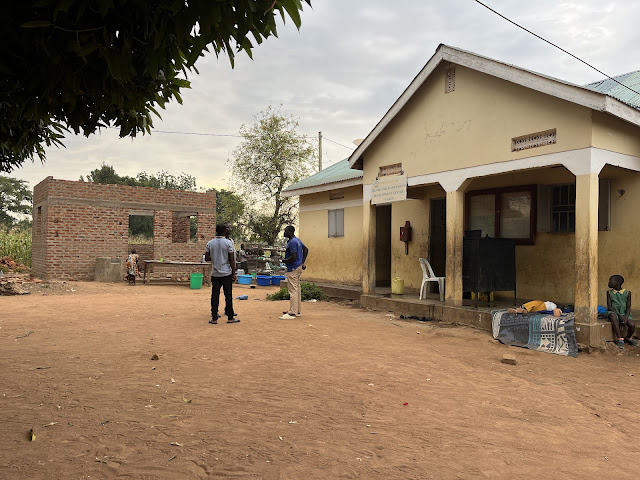By Sara:
In July, my friend Jane and I spent a fun and interesting few days in Irundu, where we were invited to teach at a 2-day conference about parenting and family planning. Reverend Silas, who was one of Anthony and my students at the Pentecostal Bible College in 2009, invited us to come and he organized his church members for the event.
The church has a guest room in their church office, where Jane and I stayed. They took really good care of us and were very generous with plenty of food and tea the whole time we were there.
In our guest room:
Silas and many families in his church are struggling to care for their children and many families in the community are unable to feed, clothe, and educate their children well. He wanted us to share with the church about how they can prepare and plan for their families in order to be able to be better parents. The issue is not about population control or telling people not to have children. Rather, it is the church's concern for parents to be able to be good parents - providing for, teaching, and guiding children; understanding the difference between for example, using a condom and having an abortion; and wanting to have space between pregnancies for the mother to recover and have quality time with the baby.
Here is Silas introducing us on the first day:
The teaching went extremely well. People in Uganda use the phrase "family planning" to refer to what Americans would call "birth control methods". But Jane and I wanted to explain how "family planning" is not about preventing pregnancy, but about more general planning and preparing for and caring for a family, even beginning to think about it before getting married.
So Jane started out by talking about the purpose of parenting, using God - our Father - as an example. God created the whole world, including everything Adam and Eve would need before making them - he planned ahead. He provided for their needs, spent time with them in the Garden of Eden, gave them instructions, and disciplined them when they sinned. And even in his punishment he was merciful - he went to them, made them clothes, and went on with his work of redemption. Likewise, parents have a responsibility to not only take care of their children physically, but to also talk to them, instruct them, teach them about God, discipline them, and seek their children out for reconciliation when the children misbehave. Since children are such a blessing from God, parents are stewards of the children God has gifted them and therefore parenting should not be taken lightly. Jane also emphasized how even unmarried people and those who cannot have children can and should take part in parenting through their relationships with other peoples' children.

After Jane had established the responsibilities of parents, I gave a session on the basic biology of how the human reproductive system works. It was similar to when I taught high school biology in Minnesota. I also listed and explained what kinds of birth control methods there are, how various types work, and the difference between abortion and methods that prevent fertilization. Many people did not know what happens during the menstrual cycle and had no idea why a woman might get pregnant at a certain time, but not at another. They also didn't understand how different birth control methods work or what they even are and therefore only knew about them based on rumors and myths they had heard before. But they appreciated getting a better understanding of how their bodies work so they can plan their families better and use that knowledge to teach their own children about sex, rather than leaving it as a mystery for the children to find out on their own.
At the end, Jane brought it all together, talking about how parents can use those methods to plan for and space their children, in order to parent their children better. In Uganda, school is not free, not even the government schools and because of an increasing desire for education, this has resulted in peoples' expenses shooting up in recent decades. Many schools are very expensive - imagine if each year of elementary or high school cost more than a year of college (college is way less expensive in Uganda than in the US, but proportionally here it is cheaper than grades 1-12 at certain schools). This creates a huge challenge for parents who want to educate their children, but have to come up with the money for all the school fees. Even if a family raises more than enough food to feed themselves for a year, many of those people sell it all off to pay for school fees. So, Jane pointed out that it is good to be preparing for children, even before getting married, so you are not taken by surprise by school fees when the children are born. Maybe buy a goat when you get pregnant and raise it as an investment for the child - let it multiply and be a source of income for school fees or medical fees for them as they grow up.

One evening, we went to Silas' home for dinner. He lives in a very beautiful area of the country, very close to Lake Kyoga, but on the other side from Soroti.
Our last day was a Sunday, when I had the opportunity to teach the church a Bible study method they can use to study the Bible with their families. It was a good application of the things we had been teaching - giving parents a tool they can use to help them raise their children to know the Lord and to be able to talk to their children about meaningful topics.























































